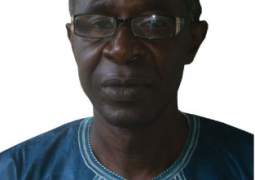
The day was set aside to raise awareness about pneumonia, promote interventions and generate action in combating pneumonia. The theme for this year’s commemoration is: “Universal access for pneumonia prevention and care.”
On behalf of the Minister of Health and Social Welfare, Dr Omar Sey, the deputy Director Muhammed Saho said the health ministry believes that overcoming pneumonia and its burden requires collective action and initiatives from individuals, and the public and private sectors.
He said they recognize the importance of community action and participation in the fight against pneumonia.
Globally, more than 2,500 children under the age of five die from pneumonia every day, which is close to one million each year, Mr Saho said.
“This is nearly 1 in 6 of the total deaths in this age group, and most of these deaths are entirely preventable,” he said, adding that over three-quarters of children who die from pneumonia live in Africa or Southeast Asia.
He cited the statistics of the Health Management Information System, which shows that 66,320 children under the age of five were diagnosed with pneumonia at the outpatient department and 182 children died due to severe pneumonia at the inpatient department in 2014.
“The decline in pneumonia deaths has been slower than other diseases and, therefore, efforts must be scaled up in order to meet the global challenge to end these preventable childhood deaths by the year 2030. Pneumonia affects children and families everywhere, but almost all deaths from pneumonia occur in poor rural communities,” Mr Saho went on.
However, evidence shows that children are dying from pneumonia because existing and effective interventions outlined in the global action plan for the prevention and control of pneumonia and diarrhea (GAPPD) are not readily available for all.
He recommended proper nutrition, vaccination, hand-washing with soap and clean running water, low-emission cook stoves and exclusive breast feeding for newborns to protect and prevent children from pneumonia.
For children and newborns with pneumonia, he said early access to effective, appropriate, affordable antibiotics and oxygen therapy can be lifesaving.
These existing interventions could protect and save the lives of hundreds of thousands of children and newborns, if more widely accessed and properly used, he said.
“Prompt and correct treatment of pneumonia and diarrhea, which accounts for 25 per cent of all childhood deaths globally, can drastically reduce child mortality,” he said.
“The determinants of these diseases are often the same, meaning the same interventions can help to address both diseases, such as exclusive breast feeding, proper nutrition, HIV prevention and vaccination. Further integrating quality care of childhood illness in community and health facilities can increase access to appropriate prevention and treatment service for children.”
UNICEF communication for development officer, Pa Ousman Manneh, in his remarks on the occasion, described this year’s commemoration as timely, as it came virtually a month following the successful implement of the National Immunization Day and the seasonal malaria chemotherapy campaign in the whole of CRR.Both, he said, covered 90% of under-five children.
He acknowledged the perseverance and commitment of mothers to the service, as well as support from fathers.
Attaining high coverage rate in the just-concluded polio campaign, seasonal malaria chemotherapy campaign and complementing this success with a community-based pneumonia commemoration day would go a long way in the revitalization and fulfillment of the rights of children, Manneh observed.
He, therefore, urged community members in CRR to promote and practise key household behaviours, exclusive breast feeding, use of LLNs, ORT, hand washing with soap and running water after using the toilet, before/after eating and before preparing meals, as well as household water treatment and early health-care seeking for pneumonia.
The UNICEF officer appealed to community heath nurse, public heath officers and other MDFTs to continually engage families and communities in the promotion of these behaviours at every given opportunity.
CRR regional health Director Jankoba Jabbi disclosed that pneumonia remains the number one infectious killer of children who die of pneumonia worldwide every year, and emphasised that combating pneumonia is essential in achieving the MDGs.
He said interventions have contributed significantly in the reduction of both pneumonia-related morbidity and mortality in children.
Despite all efforts and interventions in the fight against pneumonia, pneumonia has remained a major public health challenge in CRR and Nianja, in particular.
A total of 15,206 pneumonia cases were seen in facilities within the region in 2013 alone, 62.2% of which are under five years old.
Nianja being the most affected district registered 1,433 cases of pneumonia from July 2013 to June 2014 among the under-fives, representing 11.3% of cases seen over the period in the region, Mr Jabbi stated.
He said the region is faced with numerous challenges in their quest to kick pneumonia out of the boundaries.
He cautioned people against delayed children’s health care seeking for pneumonia, exposure of children to in-door smoke, and children dropping out of their immunization schedule, which are all affecting the health of children.
In the fight against pneumonia, Jabbie appealed to community leaders to fully support the village health service so that the MDG targets and Vision 2020 objectives can be achieved.
CRR Governor Alhagie Omar Khan, in his statement, said the journey embarked upon by the Gambia government to make a nation fit for all children has been long and challenging.
“However, our course has remained steady and our determination unfailing,” he said, adding that the government’s commitment to do more for children in the country had been ably demonstrated over the years.
He said more resources are being invested in the health sector with greater priority being placed on child survival, as children make up more than half of the population of the country, with almost 200,000 below the age of five.
These are government priorities, but the private sector should also play their part in it, he said.
Governor Khan called on the sectors to apply concerted efforts together with the health ministry in the fight against pneumonia.
He appealed to all to take their rightful positions as individual members of the society or as civil society groups, as the Gambia belongs to all and should, therefore, be jealously guarded and protected.
Read Other Articles In Article (Archive)

BOOK REVIEW: DEFYING DICTATORSHIP: Essays on Gambian Politics, 2012 – 2017
Jul 31, 2017, 11:37 AM




